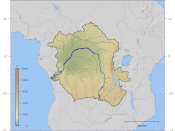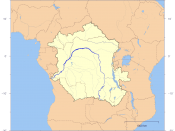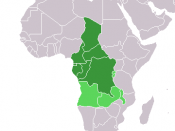The Congo basin is a vast area of land in Africa which straddles the Equator. Its
historical records begin with the 'discovery of the Congo River by the Potugese'.(Nelson
1994:2) This land was inhabited long before European arrival, the Mongo and other indigenous
people of this area already lived in this area. This essay will delineate the short term and lasting
effects of European Imperialism in the Congo basin in regard mostly to the Mongo.
To evaluate the changes which took place with the arrival of Europeans, first one must
learn about the Mongo prior to colonization. The Mongo lived in the segmentary lineage model.
They were arranged in small-scale villages, with kinship and seniority being large social
determinants. These were not the only factors involved, personal achievement played a very
important role in the Mongo. The result was a complex, competitive and dynamic
society.(Nelson 1994:13) The economy of the Mongo was based on the idea of subsistence but
in some areas specialization occurred and the result was trade among groups.
This dates back to
the first settlers of the Congo basin. The first migrants moved to the most favorable living areas,
mainly by the water. These groups would fish for their food. Other groups would settle inland
and take up hunting and gathering as their main sources of food. These groups eventually started
to trade and a market system began.(Nelson 1994: 18) The Mongo were an inland group whose
main food producing activities included hunting, gathering, fishing and agriculture. No one activity
was dominant, each was equally important and was used according to the natural factors,
including season, and local interests.(Nelson 1994:19) The Europeans came to this part of
Africa and did not understand these people at all. This misconception led to much ignorance of
the native groups.


